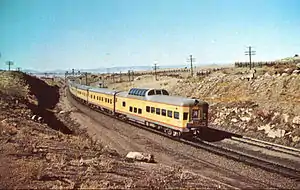Astra Dome
The Astra Domes were a fleet of streamlined dome cars built by the American Car and Foundry Company ("ACF") for the Union Pacific Railroad in 1954–1955. ACF built a total of 35 cars including coaches, dining cars, and observation cars. After Union Pacific exited the passenger business in 1971 the Auto-Train Corporation purchased most of the fleet and operated them for an additional ten years.
| Astra Dome | |
|---|---|
 An Astra Dome lounge-observation car brings up the rear of the City of Los Angeles in the 1950s. | |
 The upper-level dining area in an Astra Dome dining car. | |
| Manufacturer | American Car and Foundry |
| Constructed | 1954–1955 |
| Entered service | 1955–1971 |
| Number built | 35 |
| Fleet numbers | Union Pacific:
|
| Operator(s) | Union Pacific Railroad (1955-1971) Auto-Train Corporation (1971-1981) |
| Specifications | |
| Car length | 85 feet (26 m) |
| Width | 10 feet (3.0 m) |
| Notes | |
| [1] | |
Design
ACF produced three types of domes for the Union Pacific: coaches, dining cars, and observation cars. The ten dining cars were unique: the only dome dining cars (aside from GM's Train of Tomorrow) ever built for a United States railroad.[2]:146 The cars featured seating on both levels: 18 in the upper level in booths and 18 in the lower level at tables. Also located on the lower level was a kitchen, pantry, and private dining room with seating for 10. A dumbwaiter connected the two levels.[3]:166
The coaches could seat 24 in the dome area and an additional 36 in the lower level. The center section was given over to men's and women's lounges.[4] The lounge-observation cars were square-ended instead of the rounded-off design favored by many railroads. Like the coaches, the upper-level dome area could seat 24. In the lower level, starting at the vestibule end, was a card room (seating for five), cocktail lounge (seats for nine) and bar, stairs up to the dome level, and finally the observation area itself with seating for 19.[5]
Service history
The Union Pacific was a comparative latecomer to the dome scene when it ordered the Astra Domes from ACF in 1954; most western railroads already operated domes, some since the late 1940s.[6] ACF delivered the 35 cars to the Union Pacific in 1955 at the cost of US$10,000,000. The Union Pacific assigned the cars to its various transcontinental streamliners:[3]:166
- Five coaches to the new Challenger
- Five coaches, five dining cars and five lounge-observation cars to the City of Portland
- Five dining cars and five lounge-observation cars to City of Los Angeles
- Five lounge-observation cars to the City of St. Louis
The Union Pacific found it necessary to assign a second steward to the upper-level dining area.[7]:66 The Union Pacific gave great publicity to the novelty of dome dining cars operating between Chicago, Portland, Oregon and Los Angeles.[8]:213–214
After the Union Pacific exited the passenger business in 1971 it sold two of the dome coaches (#7004 and #7008) to the Alaska Railroad for use on its AuRoRa streamliner.[3]:211 UP retained dome coach #7006 and dome lounge-observation #9004 for company use and donated dome diner #8003 to the National Railroad Museum in Green Bay, Wisconsin, where it remains today. The remainder of the fleet–seven coaches, nine dining cars and fourteen lounge-observation cars–were purchased by the new Auto-Train Corporation for use on the Auto-Train. After Auto-Train's bankruptcy in 1981 the fleet was sold and dispersed. Many remain in private hands.[1]
References
- "Union Pacific". Retrieved November 9, 2013.
- Wegman, Mark (2008). American Passenger Trains and Locomotives Illustrated. Minneapolis, Minnesota: Voyageur Press. ISBN 978-0-7603-3475-1.
- Wayner, Robert J., ed. (1972). Car Names, Numbers and Consists. New York: Wayner Publications. OCLC 8848690.
- Union Pacific Railroad. "Chair". Retrieved November 9, 2013.
- Union Pacific Railroad. "Observation-lounge". Retrieved November 9, 2013.
- "Kit/Product Reviews". Prototype Modeler. October 1978. Archived from the original on 2013-11-10.
- Porterfield, James D. (1993). Dining by Rail: The History and Recipes of America's Golden Age of Railroad Cuisine. New York: St. Martin's Press. ISBN 0-312-18711-4. OCLC 26809358.
- Burness, Tad (2001). Railroad Advertising: Riding the Rails Again. Iola, WI: Krause Publications. ISBN 0873492749. OCLC 47780644.